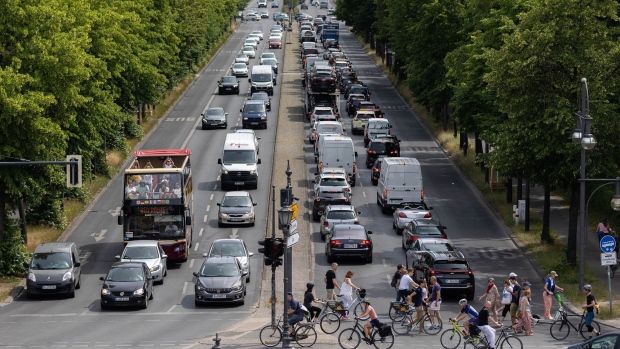Mar 8, 2023
Spain Disappointed by Germany’s Last-Minute Challenge to Car Ban
, Bloomberg News

(Bloomberg) -- Germany may set a dangerous precedent by challenging a European Union agreement to phase out new combustion-engine cars starting in 2035, a Spanish deputy prime minister said.
Modifying the proposal so late in the debate could disrupt the way the bloc crafts key policies in the future and send confusing signals to investors and industries planning for the shift to clean energy, Teresa Ribera said in an interview.
Germany, where auto manufacturing is the cornerstone of the economy, asked the EU’s executive arm to exempt cars powered by synthetic fuels, throwing a wrench into an already agreed-upon plan to reduce carbon emissions. Italy subsequently joined Berlin in threatening to derail the ban, with the government of Prime Minister Giorgia Meloni arguing it makes little sense and puts thousands of jobs at risk.
“It’s disappointing,” said Ribera, who’s also Spain’s environmental transition minister and is pushing for quicker cuts to emissions. “What if other governments decide to do something similar on whatever issue? The procedural rules are for everybody.”
Germany’s auto industry employs about 800,000 people and has revenue of about €411 billion ($435 billion).
Spain is the continent’s No. 2 car producer, with the industry responsible for about 11% of its annual economic output. Prime Minister Pedro Sanchez is pledging more than €4 billion to transform the industry and make the nation a hub for electric vehicles.
The European Commission shouldn’t delay its final decision on the proposed 2035 ban, Ribera said. The dispute could be resolved in another venue, such as negotiations on Euro-7 emission rules, to prevent ripping up the current proposal and starting discussions from scratch, she said.
Ribera attributed Germany’s objections to strife within Chancellor Olaf Scholz’s ruling coalition.
“They may have a domestic political difficulty, but now they have exported their domestic political difficulty to the whole European Union,” Ribera said, adding that the bloc still needs to asses the impact of synthetic fuels on carbon-reduction goals.
A final EU vote on the ban agreed upon last year was scheduled for March 7 but then delayed amid fears Germany may abstain. EU and German officials are in talks to find a compromise.
©2023 Bloomberg L.P.





